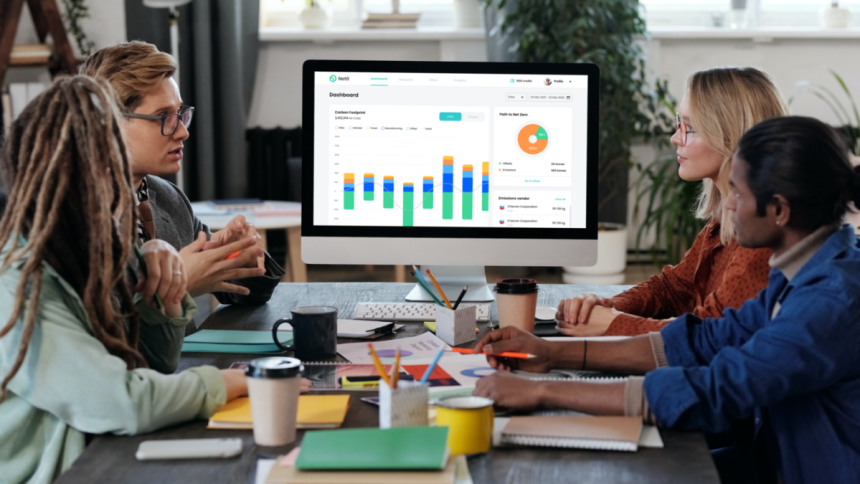Businesses are increasingly under pressure to adopt sustainable practices. One of the most pressing challenges is decarbonization—reducing carbon emissions to combat global warming. Advanced analytics and digital tools have become essential for companies to track, manage, and achieve their decarbonization goals. These technologies not only enhance efficiency but also provide valuable insights for strategic decision-making.
Enhancing Efficiency and Accuracy
Advanced analytics enable businesses to collect and process vast amounts of data with unprecedented accuracy. By leveraging machine learning algorithms and artificial intelligence, companies can identify patterns and trends that are not immediately apparent. This level of detail is vital for monitoring carbon emissions across various operations. Moreover, digital tools can automate data collection, reducing the likelihood of human error and ensuring that the data is both reliable and up-to-date. Consequently, businesses can make more informed decisions and implement more effective strategies for reducing their carbon footprint.
Enabling Real-Time Monitoring
One of the key advantages of digital tools is the ability to monitor emissions in real time. Traditional methods of tracking carbon emissions often involve periodic reporting, which can lead to delays in identifying and addressing issues. With digital tools, businesses can receive instant feedback on their performance. This immediacy allows for quick adjustments and continuous improvement. For instance, smart sensors can track energy usage and emissions, providing real-time data that can be used to optimize processes and reduce waste. Real-time monitoring thus plays a crucial role in keeping businesses on track to meet their decarbonization goals.
Facilitating Strategic Decision-Making
Advanced analytics provide a comprehensive view of a company’s operations, highlighting areas where improvements can be made. By integrating these insights into their strategic planning, businesses can set realistic and achievable decarbonization targets. Digital tools can simulate different scenarios and predict the outcomes of various strategies, helping businesses to choose the most effective approach. This strategic foresight is invaluable in navigating the complexities of decarbonization, allowing companies to stay ahead of regulatory changes and market demands. In essence, advanced analytics and digital tools empower businesses to make proactive, rather than reactive, decisions.
Driving Innovation and Competitive Advantage
Adopting advanced analytics and digital tools for decarbonization not only supports environmental goals but also drives innovation. Businesses that invest in these technologies often find new ways to enhance their operations and develop sustainable products and services. This innovation can lead to a competitive advantage, as consumers and stakeholders increasingly prefer companies that demonstrate a commitment to sustainability. Furthermore, businesses that are early adopters of these technologies are better positioned to influence industry standards and practices. By leading the way in decarbonization efforts, companies can strengthen their brand and market position.
Improving Transparency and Reporting
Transparency is critical in demonstrating a company’s commitment to decarbonization. Advanced analytics and digital tools provide robust mechanisms for tracking and reporting emissions. These technologies can generate detailed reports that meet the requirements of regulatory bodies and provide transparency to stakeholders. Enhanced reporting capabilities ensure that businesses can accurately communicate their progress and challenges in meeting decarbonization goals. This transparency builds trust with customers, investors, and partners, and can enhance a company’s reputation. Accurate and transparent reporting also helps businesses identify areas for improvement and set more precise targets.
Transforming Data into Insights
Advanced analytics consulting specializes in transforming raw data into actionable insights. They use sophisticated techniques, including machine learning, predictive modeling, and statistical analysis, to uncover hidden patterns and trends. By understanding these insights, businesses can make informed decisions that drive growth and efficiency. For instance, consultants can identify key customer behaviors, optimize supply chain operations, and forecast market trends. This transformation of data into insights enables businesses to stay ahead of the competition and make strategic moves based on concrete evidence.
Managing Risks Effectively
Risk management is crucial for business sustainability, and advanced analytics consulting plays a vital role in this area. Consultants use data-driven approaches to identify and mitigate risks before they become significant issues. They analyze historical data and current trends to predict potential risks and develop strategies to address them. This proactive approach to risk management helps businesses avoid costly disruptions and maintain stability. By leveraging advanced analytics, businesses can anticipate challenges and implement measures to protect their operations and assets.
Final Thoughts
In conclusion, the integration of advanced analytics and digital tools is essential for businesses aiming to achieve their decarbonization goals. These technologies enhance efficiency and accuracy, enable real-time monitoring, facilitate strategic decision-making, drive innovation, and improve transparency and reporting. As the urgency to combat climate change intensifies, businesses that adopt these tools will not only contribute to a more sustainable future but also gain significant competitive advantages. By leveraging the power of advanced analytics and digital tools, companies can navigate the complexities of decarbonization and lead the way in creating a greener, more sustainable world.
Lynn Martelli is an editor at Readability. She received her MFA in Creative Writing from Antioch University and has worked as an editor for over 10 years. Lynn has edited a wide variety of books, including fiction, non-fiction, memoirs, and more. In her free time, Lynn enjoys reading, writing, and spending time with her family and friends.















